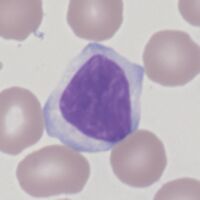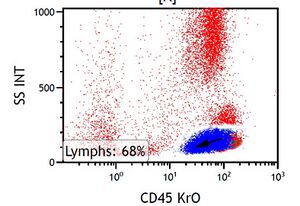Test
From haematologyetc.co.uk
Typical CLL morphology, note the small/medium size, bland chromatin pattern in a slightly squared nucleus, and the tendency of cytoplasm to gently engage adjacent red cells
Background to flow cytometric diagnosis
Typical CLL can be diagnosed with some confidence using flow cytometry.
However, individual markers may not be expressed in all cases - this can cause diagnostic difficulty particularly in distinguishing CLL from atypical cases of MCL or MZL. If this is the case then the atypical features should be reported, and the possibility of alternative diagnoses acknowledged.
Note also that cases with a low lymphocytosis (<1x109) may represent monoclonal B-lymphocytosis with CLL phenotype (click here for more).
Background to flow cytometric diagnosis
HCL expresses typical and unusual markers that together with morphology can allow diagnosed with some confidence using flow cytometry.
However, no marker is unique to HCL and unusual marker patterns can lead to diagnostic difficulty. If this is the case then the atypical features should be reported, since histopathology and molecular testing can each be used to further evaluate these cases.
| Immunophenotype of CLL | |||
|---|---|---|---|
| Major markers useful in CLL diagnosis | |||
| Marker | Freq | Level | Comment |
| κ/λ | Stg | Expect strong restricted expression of κ or λ | |
| FMC7 | Stg | Typically this marker is strongly expressed | |
| CD5 | - | Infrequent but reported in some cases | |
| CD10 | - | Infrequently expressed in typica; CLL | |
| CD11C | Stg | Strong expression of CD11c is typical of HCL | |
| CD19 | - | Expression is expected and may be strong in HCL | |
| CD20 | Stg | Expression is expected, and typically strong | |
| CD23 | - | Expression of CD23 is infrequent in HCL | |
| CD25 | wk | A typical and most frequently strongly expressed marker | |
| CD38 | wk | Not typically expressed by HCL, may be seen | |
| CD43 | - | Tends to be expressed at relatively high intensity | |
| CD79b | wk | Expression is expected | |
| CD103 | - | A chracteristic marker of HCL with good specificity | |
| CD138 | - | Predominantly by cells with plasma cell differentiation | |
| CD200 | - | Characteristically positive in HCL and often strong | |
Key to table:
Markers most useful in initial diagnosis are underlined in blue text
Key to colour code for expression frequency Click for link
Key to expression strength code and use Click for link

